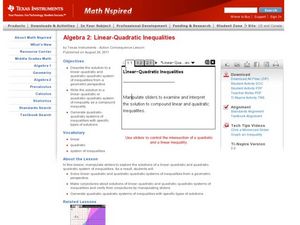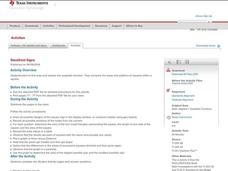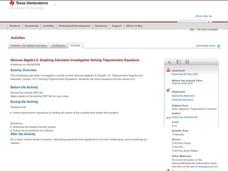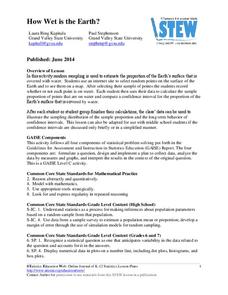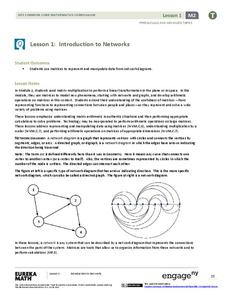Curated OER
Match Me Plus
Have your class investigate Piecewise functions by matching a position versus time graph to the function that describe the walk.
Curated OER
Linear-Quadratic Inequalities
Students graph linear and quadratic functions. In this algebra lesson plan, students create graph with specific coordinate points. They use the Ti to visualise and differentiate between the two functions.
Curated OER
Storefront Signs
Learners practice finding the areas and patterns within a square and explore the concept of quadratic functions. They observe and record the area values in a table, plot a graph of Area versus Distance and complete a variety of student...
Curated OER
Exploring Infinite Series
Learners analyze geometric series in detail. They determine convergence and sum of geometric series, identify a series that satisfies the alternating series test and utilize a graphing handheld to approximate the sum of a series.
Curated OER
Solving Systems by the Elimination Method
Pupils solve equations by elimination and use the TI to graph the lines and find the point of intersection.
Curated OER
Factoring Trinomials
Learners factor trinomials using patterns and their TI to graph their results and make predictions through this lesson. This is accomplished by solving quadratic equations through FOIL and algebra tiles.
Curated OER
It's About Time
Young scholars investigate how Global Positioning Systems work and how and why GPS receivers make errors. They graph data points and apply estimation and prediction to real-life GPS situations, discuss time delay, and complete a worksheet.
Curated OER
Computing with Mathematical Formulas
Students solve problems using formulas. In this algebra activity, students evaluate numbers using substitution. They graph their answers using a TI and discuss the outcome.
Curated OER
Microbe Multiplication Magic
Students discover how microbes multiply. In this infectious disease lesson, students calculate the growth of bacteria in various environments. Students determine the role that the environment plays in the spread of infectious disease.
Curated OER
Solving Trigonometric Equations
Pupils will investigate trigonometric equations. For this trigonometry lesson, they explore solving equations using a TI-83 calculator and solve trigonometric equations by graphing each side of the equation as a function and locating the...
Curated OER
Parabolas Exist Where?
Students recognize how parabolas are used in architecture and calculate a constant of variation.
Curated OER
Tech Algebra: A Statistics Study
Young scholars use the internet to gather a minimum of thirty pieces of data. Students create box and whisker graphs, and stem and leaf plots from the information. They calculate mean, median, mode, and range. Young scholars write a...
Curated OER
Best Guesser
Fifth graders develop strategies for estimating ages, and illustrate results by graphing and interpreting scatter plots to compare x and y coordinates.
Curated OER
Parabola
Students develop a definition of parabola and explain the relationship between the properties of the graph of a parabola and its equation. They explain how the equation of a parabola can be written in different forms and solve problems...
Curated OER
Univariate Data Analysis
Students use given data to compare baseball players. They create box and whisker plots to compare the players and determine which they feel is the best player. Students use calculators to make box and whisker plots. They write paragraphs...
Curated OER
Working with Frequency Tables
In this Working with Frequency Tables worksheet, learners analyze data that is organized in simple frequency charts. They calculate average from data presented in a frequency table, calculate a cumulative score, and identify data that...
Santa Barbara City College
How to Make a Multiplication Table
Teach children how to make a multiplication table, and they'll be multiplying for life. Following this series of steps, young mathematicians learn to use patterns and the relationships between numbers to create their very own...
Curated OER
Water Down the Drain
Did you know that leaky faucets waste $10 million worth of water? Conservationists perform an experiment and draw best-fit lines to explore how the US Geological Society determined this value.
Statistics Education Web
How Wet is the Earth?
Water, water, everywhere? Each pupil first uses an Internet program to select 50 random points on Earth to determine the proportion of its surface covered with water. The class then combines data to determine a more accurate estimate.
Statistics Education Web
The Case of the Careless Zookeeper
Herbivores and carnivores just don't get along. Using a box of animal crackers, classes collect data about the injury status of herbivores and carnivores in the box. They complete the process of chi-square testing on the data from...
Curated OER
House Project
Make young mathematicians' dreams a reality with this fun drawing project. Given the task of designing their dream home, students create drawings and physical models that demonstrate their understanding of proportion and scale.
EngageNY
Introduction to Networks
Watch as matrices break networks down into rows and columns! Individuals learn how a network can be represented as a matrix. They also identify the notation of matrices.
Population Connection
The Peopling of Our Planet
How many people live on the planet, anyway? The first resource in a six-part series covers the topic of the world population. Scholars work in groups to conduct research and make population posters after learning about the global...
EngageNY
Lines That Pass Through Regions
Good things happen when algebra and geometry get together! Continue the exploration of coordinate geometry in the third lesson in the series. Pupils explore linear equations and describe the points of intersection with a given polygon as...



